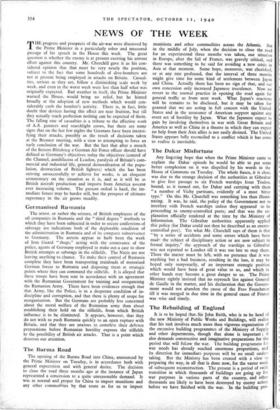NEWS OF THE WEEK
THE progress and prospects of the air-war were discussed by the Prime Minister in a particularly sober and measured passage of his speech in the House this week. The great question is whether the enemy is at present exerting his utmost effort against this country. Mr. Churchill gave it as his con- sidered opinion that that must be very nearly the position, subject to the fact that some hundreds of dive-bombers are not at present being employed in attacks on Britain. Casual- ties, serious as they are, follow a diminishing scale week by week, and even in the Worst week were less than half what was originally expected. Bad weather in itself, the Prime Minister warned the House, would bring no relief, but he hinted broadly at the adoption of new methods which would con- siderably curb the bomber's activity. There is, in fact, little doubt that devices having this effect are near fruition, but till they actually reach perfection nothing can be expected of them. The falling rate of casualties is a tribute to the effective work of A.A. gunners and searchlight crews, but there are some signs that on the last few nights the Germans have been intensi- fying their attacks, possibly as the result of decisions taken at the Brenner meeting, with a view to attempting to force an early conclusion of the war. But the fact that after a month of the fiercest Blitzkrieg a German Air Force officer should have defined as Germany's objectives today the objectives (control of the Channel, annihilation of London, paralysis of Britain's com- mercial and industrial life, general demoralisation of the popu- lation, destruction of British fighters) which she has been striving unsuccessfully to achieve for weeks, is an eloquent commentary on the situation as it is, and as it will be as British aircraft production and imports from America assume ever increasing volume. The present ordeal is hard, the im- mediate future may be harder still, but the prospect of ultimate supremacy in the air grows steadily.


























 Previous page
Previous page